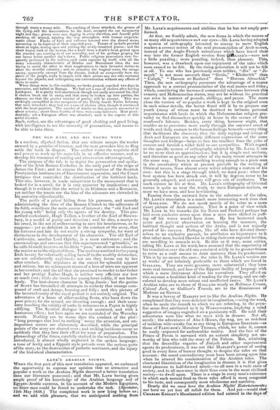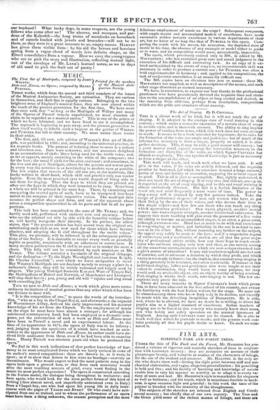LANE'S ARABIAN NIGHTS.
WHEN the first part of this new translation appeared, we embraced the opportunity to express our opinion that so attractive and popular a work as the Arabian Nights deserved a better translation than our literature possessed ; and that Mr. LANE having given ample proof of his knowledge of the Arabian language and of Egypto-Arabic customs, in his account of the Modern Egyptians, no fitter man could be found to undertake the task. (Spectator, 12th May 1838.) The completed work is now lying before us ; and we add with pleasure, that we anticipated nothing from
At first, we frankly admit, the new forms in which the names of ionised.
so many old acquaintances met our eyes—Mr. LANE having adopted a system of orthography intended to convey to mere English readers a correct notion of the real pronunciation of Arab names, instead of the Anglo-French substitutes which have found their- way into the former English version from VOLa's—were not a little puzzling ; more puzzling, indeed, than pleasant. This, however, was a drawback upon our enjoyment of the tales which soon ceased to be felt. By the rising generation it will not be felt at all. To one who has previously seen neither, "Jin" or neyeh" is not more uncouth than " Genie," " Khaleefeh" than " Caliph," " Haroon er-Rasheed" than " Haroun Alraschid." Then, the new orthography possesses the advantage of a nearer approach to a correct pronunciation of the real names and titles; which, considering the increased commercial relations between this country and Mahommedan states, may not be without its practical use even in matters of pounds, shillings, and pence. The more close the version of so popular a work is kept to the original even in such minor details, the better fitted will it be to prepare our youth (many of whom must be destined to intimate personal acquaintance with lands in which the Mahommedan religion pre- vails) to find themselves quickly at home in the scenes of their manhood's labours. Besides, every thing, however slight, that enables us to penetrate more easily through the outward crust of words and daily custom to the human feelings beneath—every thing that facilitates the discovery that the daily sayings and doings of Arab and European are merely different expressions of the same thoughts and feelings—helps to free the intellect from the yoke of
m
custo and furnishna wider field to our sympathies. With regard to the specific system of orthography adopted by Mr. LANE, it can be no more than an approximation ; but it is simple and uniform, and therefore as good as any other of the many recent attempts in the same way. There is something teasing enough to a plain man in the uncertainty which at present prevails in the writing of Oriental names, from almost every writer adopting a system of his own: but this is a stage through which we must pass : when the best system has been struck out, it will by degrees come to be generally adopted, and certainty will grow out of confusion. The mark cannot be hit at first. Mr. LANE'S orthography of Oriental names is quite as near the truth, to mere European readers, as most we have seen, and less bewildering. Passing from the outward form to the substance of the tales, Mr. LANE'S translation is a much more interesting work than that of GALLAND. We do not speak merely of its value as a more exact picture of Arab manners. That is a point of view which Mr. LANE in his remarks (in his Notes and Preface) perhaps has laid more exclusive stress upon than a man more skilled in puff- ing off his wares would have done. He has bestowed much acute and patient observation on learning the manners, the habitual thought and actions of the Arabs and is not unjustly proud of his success. Perhaps, like all who have devoted them- selves to an exclusive pursuit, he attributes an importance to it that other men, busied likewise in riding their own especial hobbies, are unwilling to concede to it. Be this as it may, some critics, taking Mr. LANE at his word, have assumed that the superiority of his translation over the old one consisted solely in its greater fitness to serve as a trade mecum to Arab manners than its predecessor. This is by no means the case ; the tales in Mr. LANE'S version are as works of art infinitely preferable to those which are found in GALLAND. They are more genuine, more substantial; they have more real interest, and less of the flippant facility of language with which a mere litterateur dilutes his narratives. They afford on this account a healthier kind of reading for the young, and are cal- culated to develop more robust and unaffected tastes. Mr. LANE'S Arabian tales are to those of GALLAND nearly as Robinson Crusoe, Colonel Jack, or Gulliver's Travels, are to the flimsinesses of Madame DE GENUS.
It was a heresy of HAZLITT not to like the Arabian Nights. He complained that they were deficient in imagination,—using the word, when he made the remark to which we are referring, in the pecu- liar sense first attributed to it by WORDSWORTH, implying a mind suggestive of images engrafted on a passionate will. He said their adventures were like what we meet with in dreams. Not all, surely : the adventures of Abu-l-Hasan, the wag, are as redolent of reckless wide-awake fun as any thing in European literature—as those of FLETCHER'S Monsieur Thomas, which, we take it, cannot be easily surpassed for undreanilike reality. And the fate of the Prince of Persia is narrated with an earnest simplicity not un- worthy of him who told the story of the Falcon. But, admitting that the dreamlike vagaries of Jiniyeh and other supernatural agents do predominate, it was not like HAZLITT'S power of seeing good in every form of human thought, to despise the tales on that account : the mood contradictory must have been strong upon him when he uttered his condemnation of the Arabian tales. The chartered libertinism of the imagination in dreams it is that gives most pleasure to half-formed minds—to all men in a rude state of society, and to all men once in their lives even in the most civilized society—to dwell upon. There is a stage in every man's existence in which such mental food as these tales afford is most congenial to his taste, and consequently most wholesome and nutritive. Dearly did we once love the Arabian Nights' Entertainments; nor have we yet lost all relish for them. And yet—would that CHARLES KNIGHT'S illuminated edition had existed in the days of our boyhood ! What lucky dogs, in some respects, are the young fellows who come after us ! The alcoves, and mosques, and gar- dens of the Kaleefeh—the long trains of memlooks on horseback and of camels loaded with jewels and brocades—will not be to them, as they were in a great measure to us, empty names. HARVEY has given them visible form : by his aid the heroes and heroines spring from a vague cloud of words into definite shape, as the Efreet consolidates from a vapour. How we envy the young rogues who are to pick the story and illustration, reflecting mutual light, out of the envelope of Mr. LANE'S learned notes, as we in days of old used to pick the fruit out of pastry !



























 Previous page
Previous page